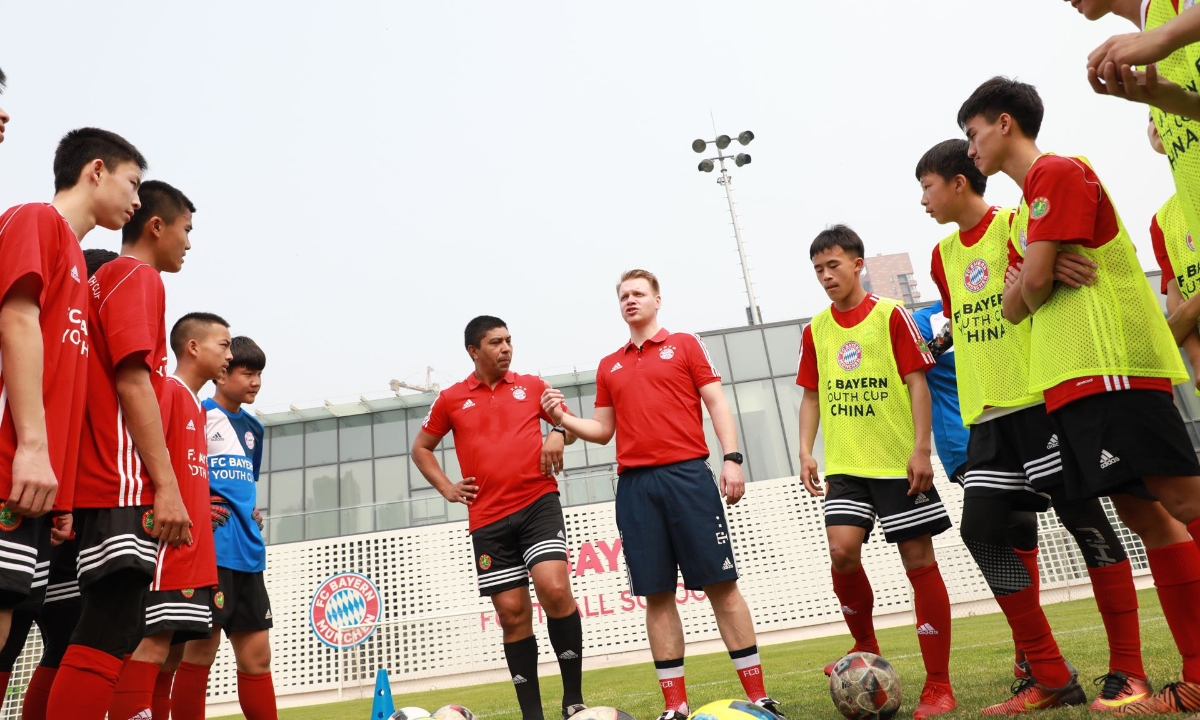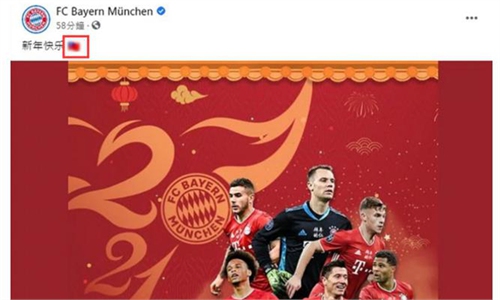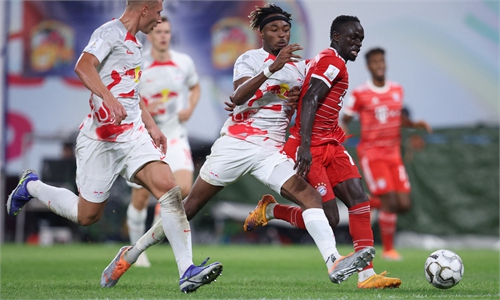SPORT / SOCCER
Former German soccer player promotes Bayern Munich’s philosophy in China, brings soccer culture to people

Matthias Brosamer (second left) and FC Bayern legendary striker Giovane Elber (first left) direct young Chinese players in FC Bayern soccer school in Qingdao, East China’s Shandong Province in April 2019. Photo: Courtesy of Brosamer
FC Bayern Munich is one of the most successful soccer clubs in the world and has a legion of fans in China.
In recent years, the club has not only brought its greatest players to China to meet fans, but also been exporting its excellent soccer philosophy to the country, especially through transplanting its youth training system here based on its decades-old successful practices and experience.
Matthias Brosamer has been a witness to the whole process.
The former soccer player, who studied at a Beijing-based university in 2006, now leads Bayern's youth training work in Asia.
With years of effort, the Bundesliga giants now have four soccer schools around China and have been working with the Chinese Ministry of Education and all levels of soccer teams.
Brosamer and his collogues have already found young rising soccer stars like 19-year-old Chinese goalkeeper Liu Shaoziyang who was signed by Bayern Munich on a three-and-a-half-year contract in December 2021.
"Our plan is to help Chinese soccer to improve, and [to help] the next generation of Chinese soccer," he told the Global Times.
A life-changing decision
An accident suffered when he was 19 changed Brosamer's life trajectory to become a professional soccer play.
At that time, Brosamer had a promising future as a professional soccer player. He had even been invited by the U21 national team of Germany.
But his fledgling career was halted by a severe injury to his ankle.
At that time, people always told him that "it was such a pity that you did not make it" or "the possibility was there to become a professional soccer player." All his friends worked in soccer, and all the conversations were around soccer.
This made Brosamer just want to exit the world of soccer to enter a new stage in his life.
When he came to China for the first time in 2004, a new world opened up in front of him.
"For the first time, I found myself," he said. "People did not know that I was a soccer player. They treated me as an ordinary person, which I really enjoyed."
At the beginning, Brosamer was just a tourist in China. In Beijing the capital city, he visited the Summer Palace, the Temple of Heaven, and was most impressed by the Great Wall. He also met in Beijing many foreign students from all over the world.
After he returned to Germany, while thinking about becoming a physical therapist, Brosamer was unable to let go of the idea of returning to China.
"What can I do in China? Can I study there?" he conducted some research on the internet and found the answer he wanted.
At the end of 2006, Brosamer was in Beijing again as a student at the Beijing Language and Culture University, and remained there for the next six years.
After being in China, Brosamer found that he could do something else without soccer, totally without soccer. Therefore, he chose to study Chinese, as well as Chinese culture and history.
"But if you love soccer once, you will never let it go," he said. "Just like the first love that you will always remember."
Brosamer picked up soccer again. Soon he became a soccer coach in Beijing and "the beautiful game," as it is so affectionately known around the world, has since never left his life.
Finding Thomas Müller
In 2012, Brosamer returned to Germany to become a coach in his hometown team SC Freiburg.
His life was changed again in 2018 when he received an invitation from Bayern Munich to work in its new branch office in Shanghai, also the headquarters of the club's development team in East Asia.
"Of course I was interested in this position. Bayern is a great club, Shanghai is a metropolis, and I know both soccer and the Chinese language," he said. "I have been trying to be a bridge from China, from Asia to Germany, to Munich."
He relocated to Shanghai with his family and serve as the Head of Sports Asia, focusing on youth training department.
Having lived in and being so intrinsically connected with China for such a long time, Brosamer has seen the increase in the number of people playing soccer in the country.
"When I left China in 2012, I felt pity that even if I would like to help, it seemed impossible [to find many talented players in China]," Brosamer said, "When I came back in 2018, I see talent, especially in younger ages."
Talking about current young players from the two countries, Brosamer admitted that Chinese players still need more creativity and teamwork, which are also what Bayern is trying to help inculcate in Chinese soccer.
In the last four years, after launching the soccer schools in Qingdao in East China's Shandong Province, Shenzhen in South China's Guangdong Province, Taiyuan in North China's Shanxi Province, Bayern Munich started the fourth football school in Taicang of East China's Jiangsu Province.
Liu Shaoziyang from Wuhan, Central China's Hubei Province, who became first Chinese male goalkeeper ever signed by an European soccer club, has even trained in Munich several times. Liu's growth has been remarkable, according to Brosamer.
Bayern Munich has a tradition of having the world's greatest goalkeepers on its roster, including Sepp Maier, Oliver Kahn, and current German captain Manuel Neuer. Brosamer hopes that Bayern will find more young talent in China in the future to feature in other positions in the team.
"China 100 percent has the soccer talent. There is a Chinese 'Thomas Müller' here," he said. "But the problem is, this talent is probably not playing soccer now."
In Europe, soccer is a part of the society. Little kids play soccer with their grandpas, and they go to any pitches on Saturdays with their parents. Everybody talks about soccer. Everybody has a dream to become a soccer player, Brosamer said.
He concluded: "People need to love soccer. This is why we are here to not only teach the kids, but also bring this whole soccer culture into this country. This is also part of soccer development."



